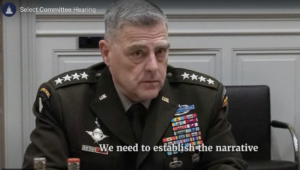
General Mark Milley, Chairman of the Joint Chiefs, in taped testimony in the first night of hearings, courtesy US House
The first of the public hearings of the House Select Committee to Investigate the January 6th Attack on the United States Capitol aired on multiple platforms tonight. It was two hours of preliminary case-building—ultimately against Donald Trump for trying to subvert the presidential election results—with testimony and taped depositions as evidence, and video montages mostly for emotional effect.
The Committee’s website said before it aired: “The committee will present previously unseen material documenting January 6th, receive witness testimony, and provide the American people an initial summary of its findings about the coordinated, multi-step effort to overturn the results of the 2020 presidential election and prevent the transfer of power. The committee will also preview additional hearings.”
The hearing did those things, but not well. Here are six reasons why:
- As Carle Hulse says at the Times, “This prime-time event is new territory for the House. Major congressional hearings can extend into the night but are typically held during the day, as were the famous Watergate and Iran-Contra hearings. This is a gamble in an effort to elevate its importance. The risk is it not living up to its billing.” The media has already provided 17 months of footage and analysis. It has been overload, an unreality, and there persists a lingering fear and anger that enough has been done about it. Donald Trump remains popular to his base and is likely to be the Republican nominee for president; 68% of Republicans still say he won over Biden. We might ask who the intended audience for these hearings are, and what effect they are meant to have. The hearing tonight was underwhelming in the context of what has already been said and shown, and by making it primetime, after nearly a year and a half, and 1,000 witnesses interviewed, and 140,000 documents collected, the stakes were too high.
- The six “episodes” of the hearings were produced by James Goldston, the former president of ABC News, the Times says, “as if they were a docudrama or a must-watch mini-series…tailored for the streaming era and a media world fueled by viral moments.” For Trump supporters who hate Hollywood as synecdoche for blue conspiracies, antisemitism, and shouts f fake news, this will offer more material. Worse, things did not go smoothly in tonight’s production; there were always waits for clips to start, and once a rogue audio clip playing over the live testimony of filmmaker Nick Quested, amplifying a sense of unreality or sloppy preparation. The staging of the two live witnesses’ testimony seemed forced and fragmentary,. When Chairman Bennie Thompson (D-MS) tried to sum up what Quested had just answered, he got details wrong about the number of Proud Boys witnessed by Quested.
- Chairman Thompson, who split his speaking duties with Liz Cheney (R-WY), does not read aloud well. He mispronounces words and proper names and does not read ahead of what he is saying, so necessary emphases, the music of the sentences, and sometimes even meaning are lost. He is also quite…undynamic, which is to say monotone and lacking in personality.
- Mr. Thompson said in his opening remarks that the assault was done on the encouragement of Donald Trump, and there can be no doubt that the big prize, in most ways the only prize, is Trump. But even this opening is a careful statement. I hope I am wrong, but they seem not to have evidence of Trump directly colluding with Proud Boys, Oath Keepers, Vets for Trump, or any other group that can be pinned to the actual violence of that day. The Committee also appear to hedge by saying the investigation is ongoing and that over “weeks,” they will continue to find evidence. The implication is that they do not have what they need. (The closest thing to it in today’s hearing was evidence that Trump was told by many people in his administration, and by his daughter, that he had lost the election, yet he acted as if that was not true. He also did not call, on January 6th, Homeland Security, Department of Justice, or the National Guard. Pence did, and later Trump’s chief of staff tried to insist to General Mark Milley, who was the Chairman of the Joint Chiefs of Staff, that the “narrative” should show the president, not Pence, was in control.)
- Some of the rioters are shown speaking with Committee representatives (who go unidentified) in previously-taped depositions. Bloomberg reported a couple of days ago that “prosecutors have scored relatively few felony convictions and face growing pressure to go after targets including the organizers and the former president himself.” Only 50 rioters have pled guilty to felony charges; more than 200 pled guilty to misdemeanor charges such as “illegal parading.” There are 800 (so far) defendants, and Justice needs money and help litigating. Several shown in the tapes are shown to be on probation or still awaiting trial. Their dress and manner when speaking to Committee reps are often too informal, sometimes even insolent-looking. This does not play to convincing the public of their guilt in something devastating.
- Representative Cheney is an excellent speaker, but when she said in the hearing that bipartisan investigation was key, she is admitting that nearly every one of her Republican colleagues is against her and have refused to take part in the proceedings, and sometimes refused to testify when ordered to do so. “There will come a day when Donald Trump is gone,” she says to them. “But your dishonor will remain.” Their defiance and numbers create a weird parry to this statement.
The next episode of the hearings will air at 10 am on Monday.
